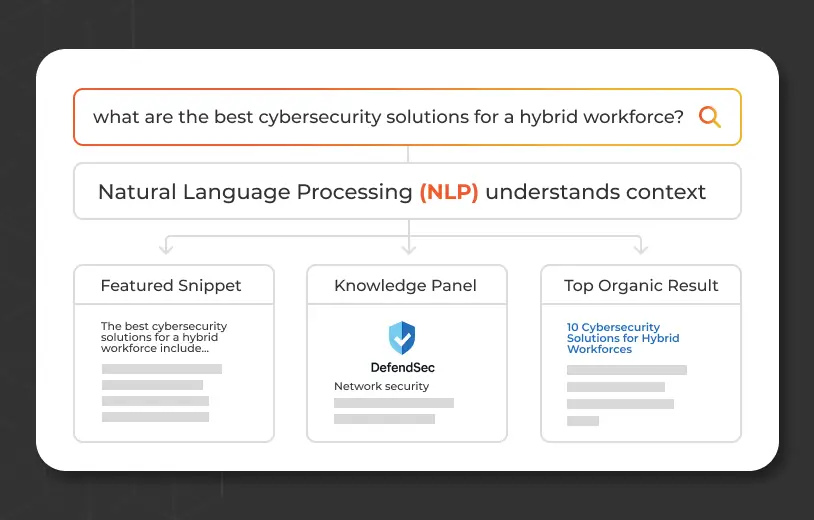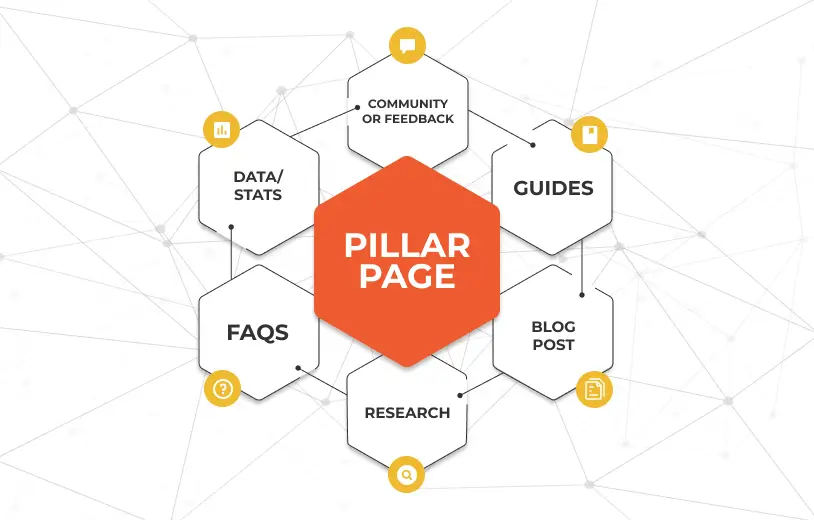Key Takeaways
- Keyword Stuffing is Obsolete: Modern SEO success comes from understanding user intent and context, not from repeating keywords.
- NLP Decodes Intent: Natural Language Processing (NLP) allows search engines like Google to understand the meaning and nuance behind a user’s query, delivering more relevant results.
- Focus on Topical Authority: Instead of targeting single keywords, build comprehensive content hubs that cover a subject in-depth to establish your brand as a definitive resource.
- Write for Humans First: Create content that is natural, readable, and directly answers the questions your audience is asking. This user-centric approach is what NLP models are designed to reward.
In modern digital marketing, the conversation around Search Engine Optimization (SEO) has shifted. Gone are the days of keyword stuffing and rigid, robotic content.
Today, the key to unlocking sustainable online visibility lies in understanding and embracing a more sophisticated approach: Natural Language Processing (NLP).
For high-end, enterprise-level clients, this isn’t just a trend; it’s a fundamental aspect of a modern, effective SEO strategy.
Let’s look at what NLP is in SEO and how
What is NLP in SEO?

At its core, Natural Language Processing is a field of artificial intelligence that helps computers understand, interpret, and generate human language.
In the context of SEO, NLP allows search engines like Google to move beyond simple keyword matching. Instead of just identifying the words in a query, they can now grasp the intent behind them.
This is the difference between a search for “running shoes sale” and “what are the best running shoes for a beginner.” The former is transactional, while the latter is informational. NLP enables search engines to distinguish between these nuances and deliver more relevant, helpful results.
In 2020, Google stated that its NLP model, BERT, now impacts nearly 100% of all English search queries, showing the fundamental role this technology plays.
It’s the driving force behind the move towards “semantic search,” where the context and relationship between words are as important as the words themselves. This means that a web page can rank for a particular keyword even if it doesn’t contain that exact phrase, as long as the content comprehensively covers the topic and satisfies the user’s intent.
The Power of NLP Search
The rise of voice search and more conversational queries has further accelerated the importance of NLP. People no longer type fragmented keywords into search bars. They ask questions, make statements, and expect a direct answer.
An “NLP search” understands these natural language queries and provides a direct, and often rich, response.
This can take the form of a featured snippet, a knowledge panel, or an AI-powered overview, all of which are designed to provide the user with the information they need as quickly and efficiently as possible.
For businesses, this means that content must be structured to answer these questions directly. It’s no longer enough to target a single keyword.
Instead, the focus should be on creating comprehensive content that addresses a range of related questions and topics, mirroring the natural flow of a conversation.
How to Use NLP in SEO: A Practical Guide

Integrating NLP into your SEO strategy doesn’t require a degree in computer science. It’s about shifting your mindset from a purely keyword-centric approach to a more user-centric one.
Here are some actionable steps to leverage the power of NLP:
- Focus on Topical Authority: Instead of creating a dozen thin pages targeting slight variations of a keyword, build a comprehensive, in-depth resource that covers a topic from all angles. This “pillar page” and “topic cluster” model signals to search engines that you are an authority on the subject.
- Embrace Semantic Keywords: These are the related terms, synonyms, and concepts that naturally appear in a conversation about a particular topic. Tools like Google’s own “People Also Ask” and related searches can provide valuable insights into the semantic keywords your audience is using.
- Optimize for User Intent: Understand the “why” behind a search query. Is the user looking for information, a specific website, or to make a purchase? Tailor your content to meet that specific need.
- Prioritize Readability and Natural Language: Write for humans, not for algorithms. Use clear, concise language, and break up your content with headings, bullet points, and images. The more natural and engaging your content is, the better it will perform.
- Structure Your Data: Use schema markup to provide search engines with explicit information about your content. This can help them understand the context of your page and display rich snippets in the search results.
Your Next Move: From Keywords to Market Leadership
Understanding Natural Language Processing is one thing; implementing an enterprise-level SEO strategy that harnesses its power is another.
The shift from simple keyword matching to demonstrating deep topical authority requires a partner who operates at the forefront of digital intelligence. Outdated tactics yield diminishing returns, but a forward-thinking, NLP-driven approach builds a sustainable competitive moat around your brand’s online presence.
Don’t let your digital authority erode. Schedule a no-obligation strategy session with a Fahrenheit Marketing expert today.
We’ll analyze your current digital footprint and outline a clear path to leveraging NLP for measurable growth and lasting market leadership.
Partner with an agency that speaks the language of modern search.
Frequently Asked Questions about NLP SEO
Does NLP mean keyword research is no longer important?
Not at all. Keyword research is still vital, but its focus has evolved. It’s now used to understand core topics, discover user questions, and identify the language your audience uses, rather than finding phrases to repeat.
How do you measure the success of an NLP-focused SEO strategy?
Success is measured by tracking improvements in a broader set of metrics: growth in organic traffic to a topic cluster (not just one page), an increase in the number of ranking keywords per page, and higher rankings for high-intent, conversational queries.
Is this strategy only for large enterprises?
While essential for enterprises, the principles of NLP SEO apply to any business. The core idea of creating high-quality, user-focused content is universal for achieving sustainable SEO success.
